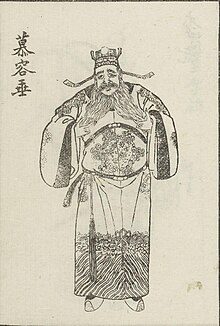
Back 慕容垂 Japanese 모용수 Korean Мужун Чуй Russian Murong Chui Serbo-Croatian Мужун Чуй Ukrainian Mộ Dung Thùy Vietnamese 慕容垂 WUU 慕容垂 Chinese 燕成武帝 ZH-CLASSICAL Bō͘-iông Soê ZH-MIN-NAN
This article needs additional citations for verification. (September 2012) |
| Emperor Chengwu of Later Yan 後燕成武帝 | |||||||||||||||||||||
|---|---|---|---|---|---|---|---|---|---|---|---|---|---|---|---|---|---|---|---|---|---|
| Emperor of Yan | |||||||||||||||||||||
 | |||||||||||||||||||||
| Ruler of Later Yan | |||||||||||||||||||||
| Reign | 9 February 384 – 2 June 396 | ||||||||||||||||||||
| Successor | Murong Bao | ||||||||||||||||||||
| Born | 326 | ||||||||||||||||||||
| Died | 2 June 396 (aged 70) | ||||||||||||||||||||
| Burial | Xuanping Mausoleum (宣平陵) | ||||||||||||||||||||
| Spouse | Empress Chengzhao Duan Yuanfei Consort Duan | ||||||||||||||||||||
| Issue | Murong Ling, Emperor Xianchuang Murong Nong Murong Bao Murong Long Murong Lin Murong Xi | ||||||||||||||||||||
| |||||||||||||||||||||
| House | Murong | ||||||||||||||||||||
| Dynasty | Later Yan | ||||||||||||||||||||
| Father | Murong Huang | ||||||||||||||||||||
Murong Chui (Chinese: 慕容垂; 326 – 2 June 396[1]), courtesy name Daoming (道明), Xianbei name Altun (阿六敦), also known by his posthumous name as the Emperor Chengwu of Later Yan (後燕成武帝), was the founding emperor of China's Later Yan dynasty. He was originally a general of the Former Yan. He was a controversial figure in Chinese history, as his military abilities were outstanding, but as he was forced to flee Former Yan due to the jealousies of the regent Murong Ping, he was taken in and trusted by the Former Qin emperor Fu Jiān, but later betrayed him and established Later Yan, leading to a reputation of him as a traitor. Further, his reputation was damaged in that soon after his death, the Later Yan state suffered great defeats at the hands of Northern Wei dynasty's founder Emperor Daowu (Tuoba Gui), leading to the general sense that Murong Chui contributed to the defeats by not building a sound foundation for the empire and by choosing the wrong successor. However he continues to be regarded as a general without parallel during his lifetime for having suffered no defeats throughout his career. Murong Chui's biography in the Book of Jin described him as seven chi and seven cun tall (approximately 188.65cm) and having long arms.
- ^ Vol. 108 of Zizhi Tongjian indicated that Murong Chui died aged 71 (by East Asian reckoning) on the guiwei day of the 4th month of the 21st year of the Tai'yuan era of the reign of Emperor Xiaowu of Jin; this corresponds to 2 Jun 396 in the Julian calendar.